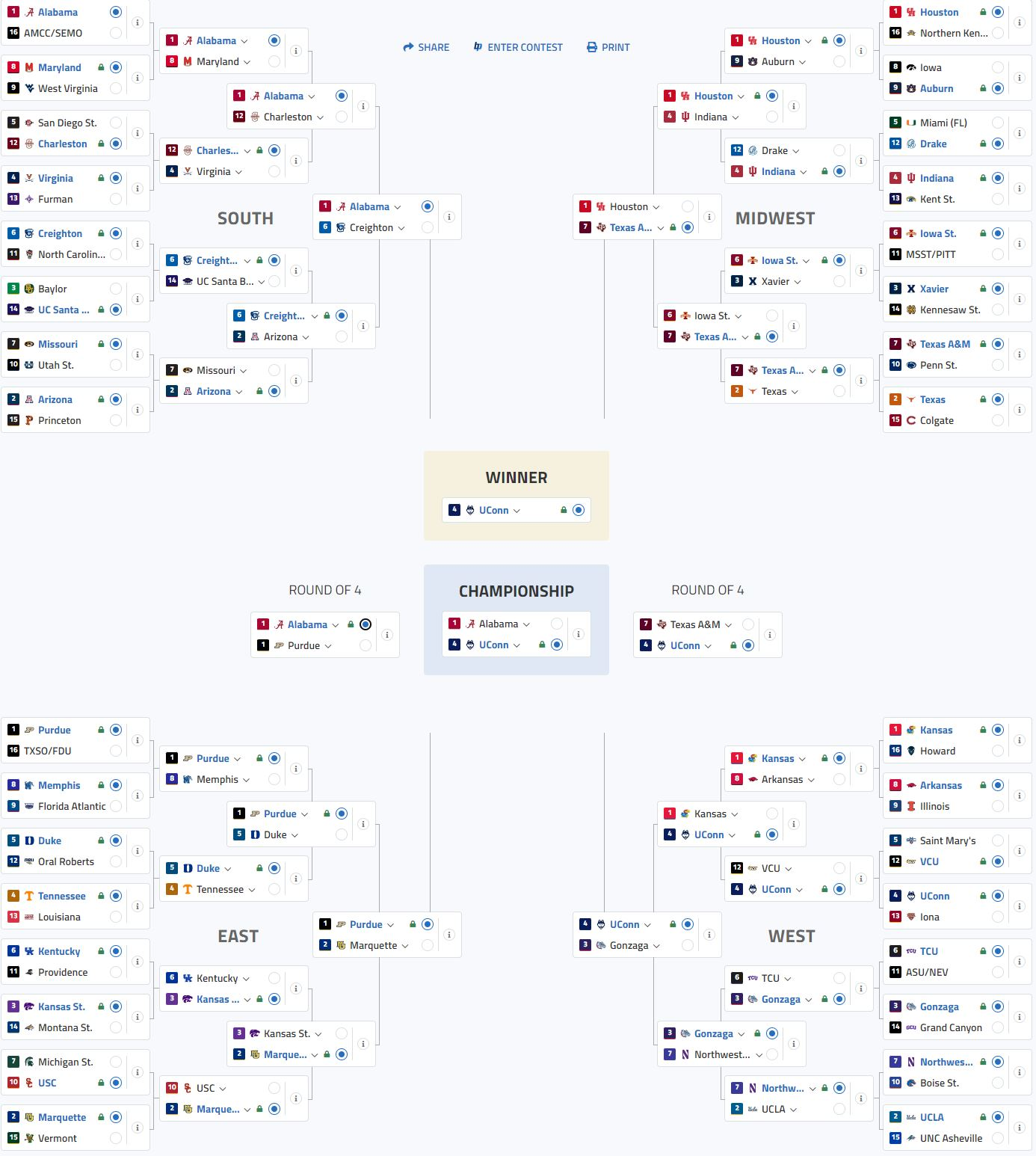Understanding NCAA bracket odds is crucial for anyone participating in March Madness, as the dream of a perfect NCAA bracket remains a tantalizing yet elusive goal. Statistically, achieving the perfect bracket entails predicting the outcomes of 63 games, a challenge so tough that experts liken it to winning the Powerball multiple times in a row. As fans eagerly anticipate tournament upsets, bracket predictions become a mixed bag of strategy and luck, drawing on March Madness statistics to inform decisions. Utilizing NCAA betting tips can enhance your chance of navigating these overwhelming odds, particularly for those looking to make smart upset picks NCAA tournament. Therefore, embracing detailed insights about bracket odds is not only a strategy but a necessity for every enthusiast aiming to stand out in their office pools this season.
When it comes to constructing your NCAA tournament picks, grasping the nuances behind tournament odds becomes increasingly significant. The quest for an immaculate tournament bracket captures the imagination of fans and analysts alike, often sparking debates about the best strategies for emerging victorious. By analyzing statistical trends and leveraging cutting-edge research, participants maximize their chances in navigating both favored outcomes and unforeseen surprises. Knowledge of March Madness statistics and insight into the dynamics of underdog performances are essential for developing successful strategies. Whether you finalize your selections based on rigorous research or rely on instinct, understanding these odds can lead to a more rewarding experience during this renowned collegiate sports spectacle.
Understanding NCAA Bracket Odds: The Probability of Winning
When it comes to predicting outcomes for the NCAA tournament, understanding the bracket odds is crucial for any serious fan or bettor. The chance of successfully picking a perfect NCAA bracket is astronomically low, with statistics from experts like Kevin Rader showing it to be about 1 in 2 to the power of 63—all the way into the quintillions. Such odds are more akin to winning the Powerball multiple times than to a simple game of chance, emphasizing how unpredictable the tournament can be from year to year.
These bracket odds reflect not only the difficulty of guessing the outcomes of 64 games correctly but also the complexity of the tournament itself. Factors such as team dynamics, player performance, injuries, and even unexpected upsets play a significant role in determining winners. For those looking to make NCAA bracket predictions, a simple reliance on favorites usually isn’t enough. A well-informed approach, utilizing March Madness statistics and insights from past tournaments, can provide an edge in navigating these treacherous odds.
The Art of Bracket Predictions: Strategies for Success
Effective bracket predictions require a blend of statistical analysis and instinct. While following the top seeds may seem like a safe strategy, it is often essential to incorporate a few calculated upset picks into your bracket for greater differentiation. History shows that upsets are a staple of the NCAA tournament—the underdogs often rise to the challenge, especially in the early rounds, providing a golden opportunity for those willing to take calculated risks with their predictions.
Additionally, employing NCAA betting tips is crucial when formulating your bracket strategy. Understanding the historical performance of teams against similar opponents, along with current season trends, can inform better upset selections. Fans should also stay informed about potential injuries and matchups, as late changes can significantly alter the landscape of the tournament. By merging statistical insight with strategic thinking, you can enhance your chances of advancing your bracket far into the tournament.
March Madness Statistics: Lessons from Past Tournaments
March Madness statistics play a vital role in making informed bracket decisions each year. By examining previous tournaments, fans can identify patterns and trends that reveal which teams are likely to perform well. For example, historically, number one seeds have a high success rate in the first round, but not all top-ranked teams advance to the later stages; understanding these nuances can greatly enhance your bracket predictions.
Moreover, analyzing outcomes of previous NCAA tournaments provides insight into the prevalence of upsets. The key to predicting outcomes lies in recognizing which mid-tier teams have shown the potential for surprising victories based on their tournament history. This analysis allows predictors to balance their brackets with reliable favorites while giving room to a few smart upset picks. Ultimately, using March Madness statistics will improve your understanding of the tournament and help you formulate a winning bracket.
The Importance of Upsets: How to Make Smart Picks in NCAA Tournaments
Upsets are an inherent part of the NCAA tournament, and recognizing their significance is essential for anyone creating a competitive bracket. Many office pools and tournaments reward creative predictions that involve picking lower-seeded teams to defeat higher-seeded rivals. Statistically, there are always a few surprise victories that shake up the tournament, leading to unexpected championship runs and busted brackets. Knowing when and where to strategically include these upset picks can be the key to advancing in your bracket competition.
Generally, analyzing team strengths, weaknesses, and individual matchups can help you identify potential upset candidates. Factors such as team momentum, the impact of a star player, and even geographic location can influence these outcomes in surprising ways. As you prepare your bracket, make sure to mix some favorites alongside a few calculated risk picks—your ability to predict upsets could give you an edge over competitors who play it too safe.
Maximizing Your Odds: Tips for Winning the Office Pool
Winning your office pool often comes down to strategy rather than pure luck. It’s essential to leverage the intelligence of March Madness statistics along with NCAA betting tips to formulate a plan that stands out among your co-workers’ brackets. The key is to balance your selections: stick with favorites for the majority of matchups while strategically picking a handful of upset teams, thereby distinguishing your bracket from others.
Another critical aspect is understanding your pool’s dynamics—how many participants there are and their tendencies. In larger pools, daring predictions can be beneficial since they help differentiate your bracket from the crowd. Familiarize yourself with past performance trends and recent game outcomes which could give you more confidence in your upset picks. This combination of thorough research and strategy will significantly enhance your chances of achieving victory in your office pool.
NCAA Betting Tips: Enhancing Your March Madness Experience
For those looking to bet on the NCAA tournament, sound betting tips will enhance your overall experience and potentially your success. By understanding the betting lines and how they reflect the public’s perception of each team, you can make smarter betting choices. Monitoring line movements throughout the tournament can also provide useful indicators of which way the momentum is shifting, helping to inform your increasingly tactical bracket predictions.
Moreover, utilizing a mix of data-driven analysis and historical context allows you to make more strategic decisions. Popular betting strategies include focusing on teams that not only excel in their conference but also perform well in the tournament. By integrating wise betting practices into your predictions, you’ll not only enjoy the excitement of the NCAA tournament but potentially come out ahead financially as well.
The Evolution of March Madness: A Statistical Approach
March Madness and its associated fanfare has continued to evolve, with statistics playing an increasingly important role in shaping predictions. In recent years, more fans and analysts have turned to data to inform their bracket decisions, moving beyond gut feelings into the realm of statistical modeling. This evolution is imperative for those hoping to not only understand the tournament but actively participate in successful predictions.
The rise of sports analytics has led to deeper insights into team performance, player stats, and match history. By utilizing comprehensive statistics, such as effective field goal percentage and rebounding margins, you can create a more structured approach to your bracket. Hence, the evolution of sport science has made betting and predicting outcomes more scientific, transforming the enjoyment of March Madness into a calculated and strategic game.
Avoiding Common Pitfalls in NCAA Tournament Bracket Predictions
When filling out your NCAA tournament bracket, it’s easy to fall into common traps that can derail your chances of winning, especially in larger pools. One pitfall is solely relying on favorites; while they often hold a higher statistical chance of winning, each tournament contains its share of unpredictable outcomes. Ignoring potential upset picks can leave your bracket looking too similar to others, diminishing your chances of standing out and claiming victory.
Another common mistake is failing to incorporate current information, such as injuries or team momentum changes leading up to the tournament. Analyzing these elements is just as crucial as evaluating historical performance. To craft a winning bracket, strategic planning, awareness of trends, and adaptability are necessary to navigate fluctuations in team performance. Ensuring you stay informed would put you at a significant advantage as you craft your predictions.
The Role of Fan Engagement in March Madness Bracketology
Engagement plays a critical role in the culture of NCAA tournament bracketology. Fans invest emotionally in their picks, often leading to spirited discussions about potential upsets and predictions based on personal allegiance to teams. This connection not only enhances the viewing experience but also can influence bracket decisions, sometimes swaying fans to choose their favorite teams over the statistically better options.
With the advent of social media and online platforms, fan engagement has risen exponentially. Engaging with forums, reading analysis from experts, and participating in discussions can provide valuable insights that improve your bracket accuracy. Creating a dialogue with fellow fans about NCAA betting tips and expert predictions adds layers of enjoyment and community to March Madness, making the tournament a shared and thrilling experience for every participant.
Frequently Asked Questions
What are the odds of successfully filling out a perfect NCAA bracket?
The odds of filling out a perfect NCAA bracket are astronomically low, calculated at 1 in 2 to the power of 63, which translates to quintillions. Statistically, it’s one of the toughest challenges due to the unpredictability of games and the occurrence of upsets, making it almost impossible for anyone to achieve a perfect bracket over a lifetime.
How can I improve my NCAA bracket predictions?
Improving your NCAA bracket predictions involves a mix of statistical analysis, understanding March Madness statistics, and keeping an eye on team performance and injuries. Additionally, considering historical trends and expert NCAA betting tips can enhance your chances of making informed picks.
What factors should I consider for upset picks in the NCAA tournament?
When selecting upset picks in the NCAA tournament, consider factors such as team strength dynamics, past performance in tournaments, player injuries, and historical data on matchups. Identifying mismatches and leveraging March Madness statistics can lead to uncovering lucrative upset opportunities.
What tips can help with NCAA betting during March Madness?
When betting on the NCAA tournament, utilize key NCAA betting tips like researching team matchups, following expert analyses, and keeping track of player injuries. Understanding trends and statistics from previous tournaments can help guide your betting strategy effectively.
Why have no one ever filled out a perfect NCAA bracket?
No one has filled out a perfect NCAA bracket because the combination of factors such as the multitude of games, the skill levels of different teams, and the likelihood of unexpected upsets create an overwhelming number of outcomes, making it statistically improbable to achieve perfection.
How does selecting favorites affect my NCAA bracket?
Selecting favorites often leads to a higher likelihood of advancing teams in your NCAA bracket; however, to stand out in larger pools, incorporating a few strategic upset picks is essential. Balancing favorites with calculated risks enhances your chances of success in bracket competitions.
| Key Point | Explanation |
|---|---|
| Odds of a Perfect NCAA Bracket | The odds of picking a perfect bracket are astronomically low, estimated at 1 in 2^63, comparable to winning the Powerball twice in a row. |
| Historical Context | No one has reported completing a perfect bracket, and as of now, no perfect brackets remain available for the current tournament. |
| Top Seeds’ Performance | Top seeds rarely lose in the first round, complicating the prediction process. |
| Strategies for Winning Office Pools | To win an office pool, you often need to pick favorites and a few upsets based on informed choices rather than randomness. |
Summary
The NCAA bracket odds are incredibly daunting, making a perfect pick virtually impossible for average fans. Statisticians emphasize that achieving a flawless bracket may be a feat no one will experience in their lifetime, with odds comparable to improbable lottery wins. When participating in bracket competitions, understanding the dynamics of team performance and making strategic picks can improve a player’s chances of success, although upsets remain a crucial and unpredictable factor.








